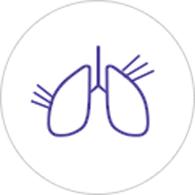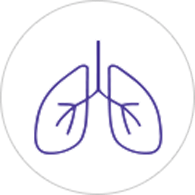- Private & confidential service
- Genuine medication
- All-inclusive service - No hidden fees
- Next day delivery
Asthma
Start your consultation

- 1 inhaler for £10.99
- Relieves symptoms quickly
- Evoholer and Accuhaler

- Effective preventative inhaler
- Reduce airway inflammation
- Available in multiple dosages

- Preventing asthmatic symptoms
- To be taken on a daily basis
- Available online with free delivery
- Preventer inhalers should be taken every day as prescribed even if you aren't experiencing symptoms.

- Fast relief from symptoms
- Used for asthma and COPD
- Same ingredient as Ventolin
- Use your reliever inhaler as soon as you notice asthma symptoms.

- Can be used for bronchitis and emphysema
- Quick short-term relief for asthma
- Consultation and delivery included
- Use your reliever inhaler as soon as you notice asthma symptoms.

- Preventative inhaler treatment
- Can treat asthma and COPD
- Free online consultation and delivery

- Preventative inhaler
- Effective daily treatment
- Long-term asthma option
- Preventer inhalers should be taken every day as prescribed even if you aren't experiencing symptoms.

- Effective daily use inhaler
- Used to prevent asthma
- Multiple dosages available
- Combination inhalers should be taken every day, as prescribed, even when you're feeling well.

- Preventative inhaler
- Effective symptom relief
- Autohaler, Aerosol and Easi-breathe
- Preventer inhalers should be taken every day as prescribed even if you aren't experiencing symptoms.

- Preventative treatment
- Accuhaler or Evohaler inhaler
- Used daily to relieve symptoms
- Preventer inhalers should be taken every day as prescribed even if you aren't experiencing symptoms.

- Combination inhaler
- Relieves asthma attacks
- Prevents worsening symptoms

- Preventative inhaler treatment
- Can be used for asthma and COPD
- Free consultation and delivery
- Preventer inhalers should be taken every day as prescribed even if you aren't experiencing symptoms.

- Long term, once-daily treatment
- Can treat COPD and occasionally asthma
- Prevent flare-up ‘attacks’ of COPD/asthma
Asthma
Asthma is a respiratory condition that affects around 5.4 million people in the UK. COPD is a chronic lung condition that worsens over time. It is most commonly caused by smoking.
Inhalers are an effective treatment for both conditions and come in the form of 'preventers' and 'relievers'. It is always advised to carry an inhaler in case of emergency.
At HealthExpress, we offer both reliever and preventer inhalers for purchase, once you have completed a free online consultation.
Topics
What is asthma?
Asthma is a chronic condition that usually develops during childhood. It affects the airways of your lungs and causes symptoms like wheezing, breathlessness and fatigue.
The severity of asthma varies from person to person and is exacerbated by environmental and genetic triggers.
Unfortunately, there is no cure for asthma, and sufferers will experience symptoms and ‘asthma attacks’ throughout their life. However, there are very effective treatments easily accessible to manage the condition. These treatments can, in many cases, completely alleviate symptoms.
As you age, you may find the severity of the condition lessens.
Please note - if you experience a sudden and unexplained difficulty breathing, you should seek immediate medical attention.

What causes asthma?
Despite how common the condition is, the exact cause of asthma is unknown. It is generally believed that it occurs from a young age, as a person’s immune system is developing.
Research shows that there are several risk factors that contribute to you developing asthma - these include:
- allergies
- family history of asthma
- premature birth
- mother smoked during pregnancy
- childhood lung infection (bronchiolitis)
|
|
|
What is happening in your body?
Inside your lungs you have lots of tubes that spread out like branches - these are known as the bronchioles. At the end of these branches are clusters of air sacs called alveoli.
When you inhale, air passes through your lungs to the alveoli. The alveoli have thin walls full of blood vessels. Oxygen transfers from them into your bloodstream.
Your bronchial tubes are very sensitive. You suffer asthma attacks at times when they are swollen or inflamed.
The muscles that surround them can also contract, and a build-up of mucus can occur.
All of this causes the bronchioles to narrow, making it harder to inhale oxygen and exhale carbon dioxide.
What are the triggers?
If you are asthmatic, you will find a number of situations and substances can trigger asthma attacks. Examples of environmental factors and allergens include:
- illnesses (especially respiratory infections)
- a smokey or polluted environment
- mould and mildew
- physical activity (especially aerobic exercise)
- heat and humidity
- certain medicines
- stressful or traumatic experiences
- allergies
- chemicals
- air pollution
- dust mites
Asthma triggers vary between people. You may find what affects you, is not an issue for other asthma sufferers.
Once you have identified what triggers your asthma most frequently, you can look at ways of limiting exposure.
For certain triggers, it may be best to consult a medical professional - they will also be able to prescribe medication.
Severe asthma has the potential to be a life-threatening condition if not managed properly.
What is COPD?
Chronic obstructive pulmonary disease (COPD) is related to asthma in how it affects the lungs, however, it has different causes.
The term, COPD, is used for numerous respiratory diseases and it can be prevented with the same treatments as asthma. These include:
COPD is characterised by a difficulty breathing, brought on by the narrowing of airways. The condition is prevalent for smokers, as exposure to irritants is the leading cause. It is also possible for non-smokers to develop it too.
The condition is most common in middle-aged and older smokers.
Please note - you should seek immediate medical attention if you experience a sudden and unexplained difficulty breathing.

What causes COPD?
COPD includes the diseases:
- emphysema
- chronic bronchitis
In the developed world, the most common cause of COPD is smoking.* In the developing world, the main cause is over-exposure to pollution or fumes from dangerous cooking appliances with poor ventilation. However, the way these causes lead to COPD is the same.
The chemicals that are inhaled irritate and damage your lungs’ airways, particularly the alveoli - these are air sacs that oxygen passes through into the bloodstream. This form of damage to the alveoli is diagnosed as emphysema.
Alternatively, when the irritants in cigarette smoke contact your bronchioles, they can damage the lining and cause inflammation. If this inflammation becomes long-term, it is called chronic bronchitis.
With inflamed and damaged lungs, it becomes difficult for you to inhale enough oxygen. The oxygen that is inhaled can then not be properly absorbed. The result is the uncomfortable symptoms of COPD - breathless and coughing.
You can suffer from the early stages of COPD without realising. That is why it is best to quit smoking - especially if you work or live in a polluted environment.
*It is also possible for exposure to secondhand smoke to cause COPD.
What are the symptoms?
Asthma
As you would expect, the main symptoms of asthma relate to difficulty breathing:
- breathlessness
- coughing
- wheezing
- chest tightness
-
 Breathlessness
Breathlessness
-
 Wheezing
Wheezing
-
 Tightness in the chest
Tightness in the chest
-
 Coughing
Coughing
-
 Light-headedness
Light-headedness
However, there are other asthma symptoms that are the result of reduced oxygen intake. These also indicate a more serious attack. If you experience any of the following, you should seek immediate medical attention:
- drowsiness
- fatigue
- confusion
- lightheadedness
- fast heartbeat
- loss of consciousness
- blue fingers or lips
If your symptoms do not improve quickly after treatment or you do not have access to your treatment, you should treat the attack as an emergency and consider calling an ambulance. Asthma attacks have the potential to be deadly if not taken seriously.

COPD
Symptoms of the condition are very similar to asthma, with a few differences. Strong indicators of COPD include:
- shortness of breath
- coughing
- wheezing
- chest infections
If you are unsure of what the cause of your symptoms is, you should visit your doctor. Your doctor will consider your medical history, lifestyle factors and symptoms. They may also perform a series of tests, including a spirometry test to check your lung function.
How can asthma be managed?
The most effective method of managing asthma is to identify your triggers and find ways to limit exposure.
For example, it may help to treat seasonal allergies and ensure you are regularly vaccinated for influenza and pneumonia. If you are asthmatic, you will be able to get annual vaccinations by speaking to your doctor.
In some cases, this may be impractical or unfeasible to completely guard against triggers. Thankfully, there are numerous treatments designed to stop flare-ups and prevent them from occurring.
The most effective treatment for asthma is oral inhalers, classified as either ‘preventers’ or ‘relievers’. It is also possible to use combination inhalers - that combine the effects of preventers and relievers, for example, Fostair, Seretide or Symbicort.
Inhalers are used in different ways. It is important you understand how to use yours. Your prescribing doctor should give you a demonstration. If you are still unsure, you should ask your doctor or pharmacist for another explanation.
You should return to your doctor for regular reviews, so that they can check the medicine is working and that your inhaler technique is correct.
You can also consult the patient information leaflet that is included with all medicines.
Preventer inhalers
These inhalers are long-term treatments that you should use daily. They reduce sensitivity, swelling and mucous production and prevent attacks from occurring.
Preventers contain a low-dose of steroids, which are effective anti-inflammatory agents. These are corticosteroids which are naturally produced in your body. If used correctly, they are not dangerous.
You can tell if you have a preventer as they are usually brown. Popular versions include Clenil Modulite and Flixotide. All of these and more are available to order from HealthExpress.
Reliever inhalers
These inhalers are used in the event of attacks and ease symptoms. They relax the muscles that surround your airways and make it easier to breathe - increasing lung function and airflow.
The vast majority of people diagnosed with asthma are prescribed one of these inhalers. You should use it when you come into contact with irritants.
If you find you are using it regularly, you should contact your doctor. It might be better for you to use a preventer inhaler.
Relievers are normally blue. Popular versions include the bronchodilators Ventolin (albuterol), Salamol and Bricanyl.
How does my type of inhaler impact the environment?
The type of inhaler you choose can significantly impact your carbon footprint, as some inhalers emit more carbon than others. Metered dose inhalers, for instance, contain propellants that are major contributors to carbon emissions. In contrast, dry powder and soft mist inhalers produce substantially less emissions.
Reduce your carbon footprint
- MDIs release harmful greenhouse gases with each puff
- These gases cause global warming
- Low-carbon inhalers, such as DPIs and SMIs, can cut your carbon footprint
When selecting an asthma inhaler, ask your doctor about environmentally friendly options.
Can I buy asthma treatment online?
You can order treatment for asthma and COPD from HealthExpress. You should first have been diagnosed with one of the conditions by your regular doctor. They should also have prescribed you the product you are considering.
We ask that you complete a short, online consultation before you order. This will allow our doctors to check your symptoms, medical history and decide on the correct treatment.
If the doctors decide not to prescribe (for any reason), we will refund you.
All orders are shipped with free next-day delivery – check our delivery page for cut-off times. The entire process usually takes no more than 24 hours.
If you have any questions, please do not hesitate to contact Customer Services. You can find contact details at the bottom of this page.
3 simple steps to get you started



















